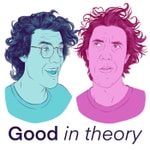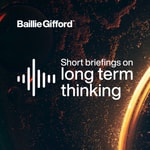Good in Theory: A Political Philosophy Podcast – Détails, épisodes et analyse
Détails du podcast
Informations techniques et générales issues du flux RSS du podcast.

Good in Theory: A Political Philosophy Podcast
Clif Mark
Fréquence : 1 épisode/24j. Total Éps: 47

Classements récents
Dernières positions dans les classements Apple Podcasts et Spotify.
Apple Podcasts
🇬🇧 Grande Bretagne - philosophy
28/07/2025#72🇬🇧 Grande Bretagne - philosophy
21/07/2025#68🇩🇪 Allemagne - philosophy
20/07/2025#79🇬🇧 Grande Bretagne - philosophy
15/07/2025#70🇬🇧 Grande Bretagne - philosophy
14/07/2025#46🇬🇧 Grande Bretagne - philosophy
13/07/2025#57🇨🇦 Canada - philosophy
11/07/2025#73🇬🇧 Grande Bretagne - philosophy
10/07/2025#62🇩🇪 Allemagne - philosophy
06/07/2025#99🇬🇧 Grande Bretagne - philosophy
05/07/2025#89
Spotify
Aucun classement récent disponible
Liens partagés entre épisodes et podcasts
Liens présents dans les descriptions d'épisodes et autres podcasts les utilisant également.
See all- https://www.patreon.com/user?u=35146517&
47 partages
Qualité et score du flux RSS
Évaluation technique de la qualité et de la structure du flux RSS.
See allScore global : 37%
Historique des publications
Répartition mensuelle des publications d'épisodes au fil des années.
46 - Athenian democracy and Plato w/ Graham Culbertson (Everyday Anarchism Podcast)
jeudi 11 mai 2023 • Durée 01:04:13
This episode is a crossover collabo with Graham Culbertson of the Everyday Anarchism podcast. Graham asked me over to talk Athenian democracy, Plato, anarchism and how modern meritocratic education sucks. We had a nice time with it and hope you do too.
45 - Humane War feat. Samuel Moyn
lundi 5 septembre 2022 • Durée 01:05:16
War tends to bring out the human propensity for atrocity. Nobody likes indiscriminate killing, torture and so on. What to do about it? One response is to avoid war altogether. According to Yale prof Samuel Moyn, that’s what most people wanted after World War II and after Vietnam. But more recently, he’s noticed a shift. Now, politicians, especially in America, are focussing on making more humane. Leaders like Obama say they’ll make war as ‘clean’ as possible by using drone strikes and special forces and minimizing civilian deaths and secret torture programs. That’s all well and good but Moyn sees a danger: making war more humane makes it easier to justify. If war is ‘clean’, why not wage it forever?
Samuel Moyn, Humane: How the United States Abandoned Peace and Reinvented WarMoyn’s podcast about legal theory Digging a Hole
36 - Moral Saints 2: Why Be a Saint?
mardi 12 octobre 2021 • Durée 33:36
This episode is about Wolf’s “Moral Saints,” Peter Singer’s “Famine, Affluence and Morality,” and Larissa Macfarquhar’s Strangers Drowning.
Susan Wolf thinks that devoting your life to helping others would be a real drag. It’d interfere with playing tennis and reading Tolstoy.
True enough but some people might have philosophical and personal reasons to do it anyway.
For example, Peter Singer argues that, if you think a child’s life is worth more than your shoes, then you’re morally obliged to give away all your money to charity.
Larissa Macfarquhar helps out with the personal reasons. She’s written a book that profiles a whole bunch of real-life do-gooders. And it turns out that even though the saintly life is tough, the saints are getting something out of it. And from their perspective, a life of Tolstoy and tennis might not be a great as Wolf makes it out to be.
References
Macfarquhar, Strangers Drowning
Singer, “Famine, Affluence, and Morality”
Wolf, “Moral Saints”
35 - Susan Wolf, “Moral Saints”
mardi 28 septembre 2021 • Durée 26:00
This episode is about Susan Wolf’s 1982 article “Moral Saints.”
You’re probably a moral enough person. But have you ever had that nagging feeling that you should be even better? That if you were really good, you would devote your life to the cause, whatever cause that might be? That you should become some kind of moral saint?
People who devote their entire lives to being as morally good as possible are held up as objects of admiration, as a kind of saintly standard that the rest of us feel vaguely guilty for not living up to.
Susan Wolf says we shouldn’t feel bad about not being saints because no rational person should want to be a saint in the first place. In this episode, I explain her argument for why it makes more sense to be cool like Paul Newman than good like Mother Teresa.
34 - The Esoteric Plato feat. Earl Fontainelle
lundi 13 septembre 2021 • Durée 01:28:10
Today I speak with Earl Fontainelle of the Secret History of Western Esotericism podcast (SHWEP).
I don’t understand Plato. Partly this is because he never writes in his own voice and partly it’s because I can’t even always tell when Socrates is joking or even what he’s talking about. The divided line? The Myth of Er? The tyrant being exactly 729 times less happy than the philosopher? These are all weird things in the Republic that are still mysterious to me.
Earl suggests that perhaps the reason Plato is so difficult to understand is because he was writing esoterically. Perhaps the dialogues contain secret messages directed to an initiated few and the weird passages I complain about actually contain wisdom of a higher order. Perhaps.
In this long and wide-ranging conversation, we talk about why so many readers of Plato believed he wrote esoterically, the secret meanings he may have been hiding, and a lot of the mysterious Plato math that I complained about in the Republic series.
References:
SHWEP episode on the Esoteric Plato
SHWEP episode with Maya Alapin on mathematical structures in Plato’s republic
Wiki on the divided line with diagram
Maya Alapin The Philosophical Implications of Interpreting Plato through Musical Analysis
James Adam The Nuptial Number of Plato
Robert Brumbaugh Plato's mathematical imagination; the mathematical passages in the dialogues and their interpretation
Francis Macdonald Cornford (trans.) The Republic of Plato
33 - The End of the End of History feat. Philip Cunliffe and George Hoare
lundi 30 août 2021 • Durée 01:05:12
I talk to Phillip Cunliffe and George Hoare about their new book The End of the End of History.
In 1989, Francis Fukuyama predicted a boring eternity of liberal capitalism and for nearly 30 years, it looked like he might be right. We had Clinton and Blair. Globalization and apathy. Kurt Cobain. According to my guests, the end of History wasn’t just about politics, it was a whole vibe.
But since 2016, things have started happening that don't quite fit the pattern and the pundits are losing their minds. Do Brexit, Trump, and the new politicization signify the end of the end of History?
We chat about how the political zeitgeist has changed in recent years and what that may hold for the future.
Phillip Cunliffe and George Hoare are, along with Alex Hochuli, co-hosts of the Aufhebunga bunga podcast and co-authors of The End of the End of History: Politics in theTwenty-First Century.
32 - Fukuyama’s “The End of History?”
mardi 17 août 2021 • Durée 27:22
In 1989, Francis Fukuyama was a foreign policy expert with an interest in Hegel. He published a little essay called “The End of History?” in which he argued that the Cold War was more than a rivalry between two superpowers or an experiment to find the most efficient way to organize an economy. Fukuyama thought it was the final chapter in a millennia-long struggle to find a way of life that satisfies our deep spiritual need for freedom and equality. Therefore the end of the Cold War would mark the end of History as such.
To argue that all of human history was coming to a conclusion was always a wild swing-for-the-fences argument but this one connected.
References
Francis Fukuyama, "The End of History?"
31 - Thought Lab 3: Utilitarianism & the Great Spreadsheet
lundi 2 août 2021 • Durée 47:24
Today, Paul Sagar and I get into utilitarianism. We talk about thought experiments that involve: drowning kids, ruined loafers, death squads and bioweapons.
The drowning children are from Peter Singer. He's a utilitarian that thinks that we rich first-world types should be giving away all our money to save the global poor from starving and malaria.
Paul disagrees. He brings in another philosopher (Bernard Williams) to argue that worrying about starving children all the time would violate his integrity. As usual, he tries hard not to offend anyone (until he gets to Hiroshima).
References:
Peter Singer, “Famine, affluence and morality”
Bernard Williams, “Against Utilitarianism”
30 - Plato's Republic 13: Choose Yourself
lundi 19 juillet 2021 • Durée 33:23
This episode covers the last bit of book 10 of Plato’s Republic.
Imagine you get to choose your reincarnation. You can come back as a tyrant, a sports star, a swan, whatever you want. What do you pick? And what do you have to know to make a good choice?
Socrates has some advice. In this final episode of Republic, tell the story of a man who travelled to the afterlife and came back to tell the tale. This puts a didactic bow on the all-night conversation they’ve been having and demonstrates how Socrates thinks poetry should be written.
Credits:
Glaucon: Zachary Amzallag
Ancient music: Michael Levy
ntro theme: Clayton Tapp
Outro theme: David Zikovitz
29 - Plato's Republic 12: Poetic Sweet Tooth
lundi 5 juillet 2021 • Durée 45:23
Socrates thinks that poetry is like candy: delicious but bad for us. If we consume too much, it’ll rot our souls. That’s because the poets just pander to our passions with no concern with or knowledge of the truth.
But pandering poets aren’t the problem. It’s us. Socrates thinks that humans have a poetic sweet tooth that makes certain kinds of stories irresistible to us. We let ourselves get carried away by them and start to believe that they’re true. Following our natural taste for art undermines reason and makes us into worse people. So how do we live if we can’t trust our taste?
Glaucon: Zachary Amzallag
Ancient music: Michael Levy
Intro theme: Clayton Tapp
Outro theme: David Zikovitz









